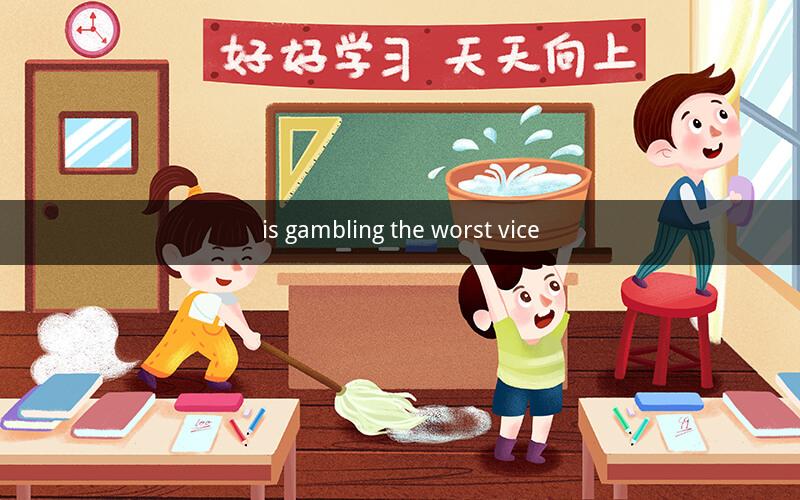
Table of Contents
1. Understanding the Concept of Vice
2. Defining Gambling
3. The Prevalence of Gambling
4. The Negative Consequences of Gambling
4.1 Financial Ruin
4.2 Mental Health Issues
4.3 Relationship Damage
5. The Debate on the Worst Vice
6. Alternative Perspectives on Gambling
7. The Importance of Regulation and Education
8. Conclusion
1. Understanding the Concept of Vice
Vice, as defined by the Oxford English Dictionary, is "an act or practice that is considered morally wrong." It encompasses behaviors that are often viewed as harmful to individuals and society. The concept of vice has evolved over time, with different cultures and societies identifying various behaviors as vices.
2. Defining Gambling
Gambling, in its simplest form, involves risking something of value (money, property, or time) on an event with an uncertain outcome. It can take many forms, including lottery games, casino gambling, sports betting, and online betting. While some individuals engage in gambling as a form of entertainment, for others, it becomes an addiction that can have severe consequences.
3. The Prevalence of Gambling
Gambling is a widespread activity worldwide. According to the American Gaming Association, the U.S. gambling industry generated $259.2 billion in revenue in 2018. The ease of access to gambling opportunities, thanks to the internet and mobile devices, has contributed to its popularity.
4. The Negative Consequences of Gambling
4.1 Financial Ruin
One of the most significant consequences of gambling is financial ruin. Many individuals and families have lost everything due to gambling addiction, including their homes, cars, and savings. The debt incurred from gambling can lead to bankruptcy and other financial hardships.
4.2 Mental Health Issues
Gambling addiction can also lead to various mental health issues, including depression, anxiety, and substance abuse. The stress of financial loss and the constant urge to chase losses can take a toll on an individual's mental well-being.
4.3 Relationship Damage
Gambling addiction can strain relationships with family and friends. The secrecy and lies associated with gambling can lead to trust issues, while the financial burden can cause arguments and conflicts.
5. The Debate on the Worst Vice
The question of whether gambling is the worst vice is a topic of debate. Some argue that it is due to its potential for financial and emotional damage, while others believe that other vices, such as drug addiction or alcoholism, are more harmful.
6. Alternative Perspectives on Gambling
Some individuals argue that gambling can be a harmless form of entertainment, especially when done in moderation. They point to the fact that many people engage in gambling without developing an addiction and that it can provide a source of income for some individuals.
7. The Importance of Regulation and Education
To mitigate the negative consequences of gambling, regulation and education are crucial. Governments should implement strict regulations to protect individuals from predatory gambling practices. Additionally, education programs should be developed to raise awareness about the risks associated with gambling addiction.
8. Conclusion
While the debate over whether gambling is the worst vice continues, it is clear that its potential for harm is significant. Understanding the negative consequences of gambling and taking steps to prevent addiction can help individuals and society at large.
Questions and Answers
1. Question: What are the most common forms of gambling?
Answer: The most common forms of gambling include lottery games, casino gambling, sports betting, and online betting.
2. Question: How can one determine if they have a gambling addiction?
Answer: Signs of a gambling addiction include an inability to control gambling behavior, lying about gambling activities, and neglecting responsibilities due to gambling.
3. Question: What are some of the financial consequences of gambling addiction?
Answer: Financial consequences include bankruptcy, loss of assets, and debt incurred from gambling.
4. Question: Can gambling lead to mental health issues?
Answer: Yes, gambling addiction can lead to mental health issues such as depression, anxiety, and substance abuse.
5. Question: How can governments regulate gambling to protect individuals?
Answer: Governments can regulate gambling by implementing strict licensing requirements, age restrictions, and limits on betting amounts.
6. Question: Are there any treatment options available for gambling addiction?
Answer: Yes, treatment options include counseling, therapy, and support groups.
7. Question: Can gambling be a source of income for some individuals?
Answer: Yes, for some individuals, gambling can be a source of income, especially those who have a talent for predicting outcomes.
8. Question: How can one avoid developing a gambling addiction?
Answer: To avoid developing a gambling addiction, one should set limits on gambling activities, avoid gambling when under the influence of alcohol or drugs, and seek help if they suspect they have a gambling problem.
9. Question: Can online gambling be more addictive than traditional gambling?
Answer: Yes, online gambling can be more addictive due to its convenience and the ease of access to various gambling opportunities.
10. Question: What role does education play in preventing gambling addiction?
Answer: Education plays a crucial role in preventing gambling addiction by raising awareness about the risks associated with gambling and promoting responsible gambling practices.